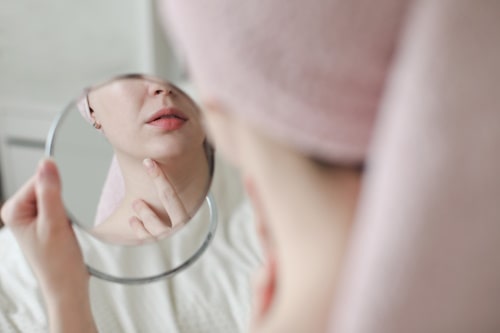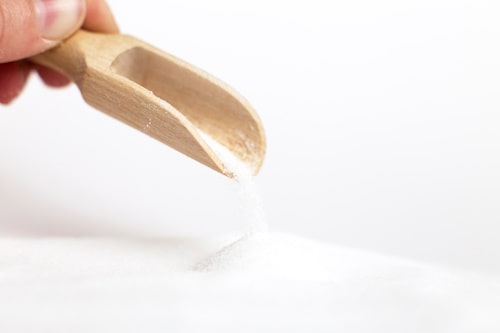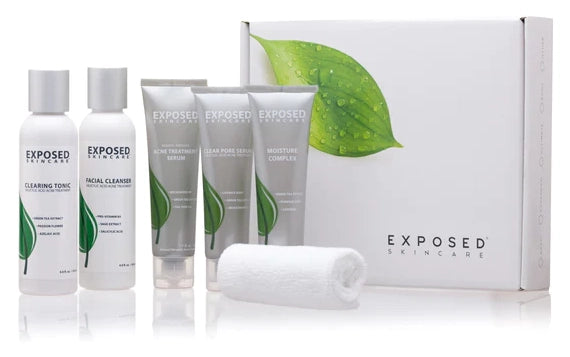From the teenage years and beyond, acne is a common issue for many. You may have even heard that certain foods can exacerbate this frustrating skin condition.
One of the biggest suspects is sodium, commonly found in salt. Hence, the question that often arises is, does sodium cause acne? Let us dive into this intriguing topic to sift fact from fiction and give you a comprehensive view.
Also read: How to choose the best acne treatment
Biggest Take-Aways:
- Sodium intake is correlated with acne but is not definitively proven to be a direct cause.
- High sodium consumption can lead to water retention and inflammation, negatively affecting your skin.
- Balancing sodium intake with a healthy diet and skincare regimen can mitigate its potential negative effects.
- Exposed Skin Care offers a comprehensive approach to tackling acne, focusing on inflammation reduction, hydration, and pore-clearing.

The Ubiquity of Sodium
When it comes to sodium, it's almost everywhere in your diet. From processed foods to your favorite bag of chips, sodium seems almost unavoidable. Yet, how does this prevalent element play into the pathogenesis of acne?
What is Sodium?
Sodium is a mineral essential for various body functions, such as maintaining blood pressure and regulating fluid balance. But like everything, moderation is key. An excessive amount of sodium can lead to various health issues, including the question: does sodium cause acne?
The Science Behind Sodium and Acne
There's ongoing debate and research about the onset of acne and how sodium might be involved. While no single study conclusively confirms the role of sodium in acne, some evidence does point in that direction.
Relationship Between Sodium and Inflammation
One of the most talked-about aspects regarding sodium and acne is inflammation. Sodium has been shown to cause inflammation in the body, a known factor in the onset of acne lesions.
Sodium and Dehydration
Too much salt can dehydrate your skin, leading to a lackluster appearance. Dehydrated skin can produce more oil to compensate, which may lead to further clogging of the pores and acne development.

Sodium and Water Retention
Sodium causes the body to retain water, which may result in puffiness and bloat. This water retention might exacerbate acne by clogging pores, contributing to acne breakouts.
Sodium and Hormones
Sodium's impact on hormones like insulin can be another potential participating factor. Insulin spikes can stimulate the production of skin oils, further contributing to the clogging of pores and, subsequently, acne.
Diet and Acne: The Salty Connection
While the science is still inconclusive, a body of evidence points to dietary habits affecting acne. Specifically, the consumption of salty foods has been significantly higher among patients with acne than those without.
Studies and Observations
Several studies have examined the relationship between the dietary intake of salty and spicy foods and acne. While the severity of the disease wasn't necessarily linked to sodium, the duration of acne was notably longer among those with higher daily amounts of sodium chloride in their diet.
Are All Salts Created Equal?
When discussing sodium, it's crucial to differentiate between types of salt. Not all salts have the same impact on health and skin.
Iodized Salt vs. Sea Salt
Many people are unaware that iodized salt can worsen acne symptoms due to its iodine content. On the other hand, sea salt contains minerals that may help improve your skin’s appearance.

The Importance of Balance
It’s not just the amount of sodium you consume; it's also what you consume it with. Foods rich in vitamin C and omega-3 fatty acids, for example, can help prevent inflammation and thereby negate some of the adverse effects of sodium.
Lifestyle Adjustments for an Acne-Free Complexion
While the jury is still out on the definitive role of sodium in acne, making some lifestyle changes can certainly contribute to keeping your skin healthy.
Stay Hydrated
Drinking lots of water can help improve skin elasticity and flush out toxins, counteracting some of the dehydration caused by sodium.
Avoid Sugary and Processed Foods
Sugary foods, drinks, and items like red meat and soda can negatively affect your complexion. The additives and high sugar content in these foods cause inflammation, which could exacerbate acne symptoms.

Monitor Your Food Intake
A food diary can help identify triggers and patterns contributing to acne breakouts. A diet rich in fruits, vegetables, and lean proteins can significantly improve your skin’s appearance.
Exercise Regularly
Regular physical activity boosts blood circulation, creating a radiant, more youthful appearance. Exercise also helps to relieve stress, a known factor in the development of acne.
Managing Acne With Exposed Skin Care
A robust skin care regimen is crucial as unavoidable diet and lifestyle factors like sodium intake can harm your skin. Exposed Skin Care offers a range of products to tackle the various factors contributing to acne, from clogged pores to bacteria.
Here's how Exposed Skin Care can help improve your skin:
- Wrinkle and Fine Lines Reduction: Our Treatment Serum combats acne and helps reduce lines and wrinkles, thanks to its unique formulation that promotes collagen production.
- Balanced Hydration: Eating too many salty foods can cause your body to retain water, leading to puffy, inflamed skin. Our Moisture Complex hydrates without clogging pores, solving the dry skin issue often observed in patients who have consumed significantly higher daily amounts of sodium.
- Targeting Severity and Duration: Whether you are an adolescent visiting an acne clinic or an adult who's tried every medical center's solutions willy-nilly, our products cater to the varying duration or severity of acne symptoms.
- Anti-Inflammation: Large amounts of sodium can inflame your skin and disturb the body’s gland functions. Our Clearing Tonic works to calm inflammation and keep your skin looking radiant.
By integrating Exposed Skin Care into your daily routine, you're taking a comprehensive approach to managing acne, one that tackles the possible participating factors head-on.
Conclusion
While patients with acne consumed significantly higher daily amounts of sodium, the scientific community has yet to reach a consensus on sodium being a direct cause of acne. This gray area makes it essential for individuals to be cautious with their diet and lifestyle choices, particularly regarding sodium intake.
Exploring the sodium-acne relationship remains a focus from medical centers to academic studies. Yet, these institutions agree on the role of inflammation and hormonal imbalances, which can be exacerbated by a high-sodium diet, as contributing factors to acne.
When it comes to mitigating the possible negative effects of sodium on the skin, balance is the key. The median approach involves moderating sodium intake while incorporating other elements like hydration and a balanced diet to keep skin conditions at bay.
In this tricky landscape, having a reliable skincare routine can be invaluable. This is where a comprehensive skincare regimen, like what Exposed Skin Care offers, becomes essential. With targeted treatments that tackle the many facets of acne, you don't have to navigate the complexities of skincare willy-nilly.
As we strive for clarity in understanding the role of sodium in acne, having a foolproof skincare routine becomes an indispensable part of the equation. With the right products and lifestyle changes, managing acne becomes less daunting.
FAQs
Does sodium cause acne?
While no definitive scientific evidence links sodium directly to acne, studies have shown that patients with acne consumed significantly higher daily amounts of sodium.
What does sodium do to the skin?
Sodium can cause your body to retain water, leading to puffiness and inflaming the skin. It can also exacerbate dry skin conditions.
Can cutting down on salty foods improve my skin?
Reducing salt consumption can help alleviate water retention and inflammation, improving your skin's appearance.
What role does sodium play in inflammation and acne?
High sodium intake can trigger inflammation, which in turn can exacerbate acne and other skin conditions.
How can Exposed Skin Care help manage my acne?
Exposed Skin Care offers a comprehensive range of products that target various factors contributing to acne, from inflammation to clogged pores, making it a robust solution for acne management.


















